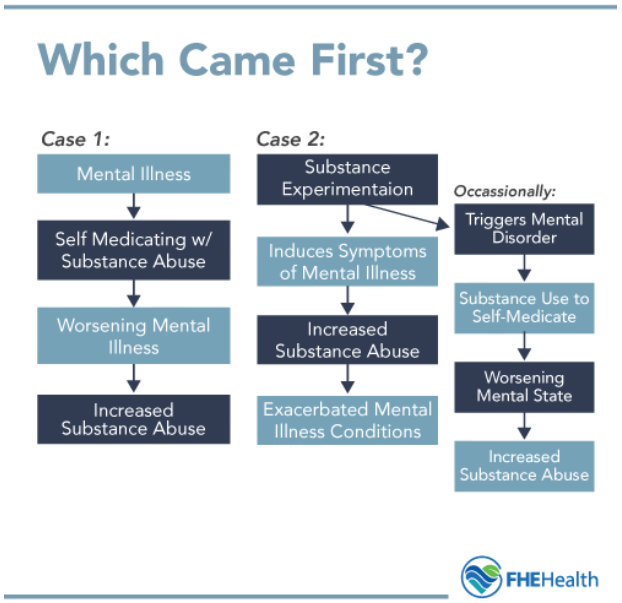Substance abuse and mental health conditions are often tied together, and underlying medical conditions can mimic the symptoms of psychiatric illnesses.
A Comprehensive Diagnosis Saves Lives
Clinical conditions can be the root cause of a mental health condition. However, the opposite can happen when treatment for a substance use disorder triggers mental illness or vice versa, as illustrated by the flowchart below from FHE Health.

The whole point of advocating for a comprehensive diagnosis is to prevent unnecessary medication that can lead to substance abuse and aggravate symptoms of emotional dysregulation.
Associations Between Mental and Physical Health
Multiple associations between mental health and chronic physical conditions significantly impact our quality of life, increase healthcare demands and other publicly funded services, and dramatically affect society.
The associations between mental and physical health compromise the well-being of patients and their families and can lead to death.
Lab and clinical diagnoses can identify the possible underlying physiologic causes that can lead to clinical symptoms of depression and anxiety. For example, here are a number of physical conditions that can mimic symptoms of anxiety and depression. For example, several physical conditions can mimic symptoms of anxiety and depression:
- Chronic pain
- Diabetes
- Heart disease
- High and low blood sugar
- Irritable bowel syndrome
- Over- or under-active thyroid
- Peptic ulcers
- Respiratory conditions like asthma and COPD
- Allergies
- Chronic fatigue syndrome
- Certain cancers
- Hypercalcemia (high levels of calcium)
- Diabetes
- Endometriosis
- Hypothyroidism
- Lyme disease
- Sleep apnea
- Vitamin D deficiency
That’s why we advocate for investigating the root cause, looking for possible medical conditions that can complicate the clinical picture, instead of simply treating symptoms.
The fastest-growing drug problem in the U.S. isn’t cocaine, heroin, or methamphetamines. Instead, it is prescription medications and over-the-counter drugs that profoundly affect teenagers’ lives. Prescription pill abuse partially explains what’s behind the fentanyl crisis.
DCF highly encourages the One Pill Call Kill campaign by the United States Drug Enforcement Administration. With your help, we can address one area where the problem starts: when healthcare practitioners prescribe medicine to someone who doesn’t need it.
The old saying goes: The difference between poison and medicine is in the dose — and we would add the need.
The numbers below reflect the findings of the research Addressing the Unprecedented Behavioral-Health Challenges Facing Generation Gen Z, conducted by McKinsey & Company in 2022.
200%
of Gen Zers feel more likely than other generations to report thinking about, planning, or attempting suicide
85%
of Gen Zers report more unmet social needs than any other generation. Unmet social needs includes income, employment, education, food, housing, transportation, social support, and safety
50%
of teenagers and young adults who struggle with mental illness also experience a substance use disorder
33%
of Gen Zers feel less in control of their health and lifespan, are less health-conscious, and are less proactive about maintaining good health.
25%
of Gen Zers cannot afford mental health services. The absolute biggest barrier to gaining mental-health treatment has been financial.
75%
of Gen Zers makes up to the Crisis Text Line’s users.
A comprehensive diagnosis can save lives and improve the well-being of survivors of psychiatric and addiction illnesses. A healthy body leads to a healthy mind.